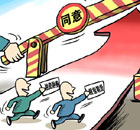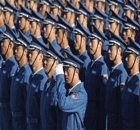Opinion
The climb in labor costs
(China Daily)
Updated: 2010-02-09 13:49
 |
Large Medium Small |
Chinese enterprises should become acclimated to rising labor costs as soon as possible because the country is striving to embrace a consumer-led growth.
The coming of the Chinese new year reminds us of the bleak employment situation the country faced a year ago. More than 20 million farmer-turned-migrant workers were found at the time returning home unemployed as the worst global recession in decades hit China's labor-intensive export sectors hard.
But recent reports that worker shortage has again gripped export hubs in China's coastal areas sound reassuring.
On the one hand, it shows that businesses are picking up. If overseas orders were not rapidly increasing, many companies would not be competing so hard to hire workers.
And it means that most migrant workers will be able to enjoy this year's Spring Festival much more than last year. At least they don't need to worry about finding a job when they return to cities a couple of weeks later.
However, for Chinese enterprises that have long capitalized on the country's enormous supply of cheap labor, ignoring the emerging labor shortage in the seasonable labor market will be at their peril.
Though the steep global economic slowdown has temporarily cut domestic enterprises' demand for more cheap labor, the stronger-than-expected rebound of the Chinese economy in 2009 indicates that the crisis has not derailed China from its path of long-term growth.
Nor has it changed the tightening labor supply that China's demographic trend consistently points to.
So, if the Chinese economy continues to rapidly grow as expected, it is more likely that domestic employers will soon have to accept rising labor costs as a matter of fact no matter how hard they complain.
Some local governments have raised the minimum wage for workers. For instance, Jiangsu province, a leading economic powerhouse, has raised its minimum wage by at least 12 percent starting this month. It is believed that a wave of nationwide salary increases is around the corner as other local governments work to attract workers for their economies.
| ||||
If the country is to rely more on domestic consumption than export and investment for growth, the government should throw its weight behind the increase in labor costs. Higher wages may eat into some exporters' competitiveness, but they are essential to boosting domestic consumption.













